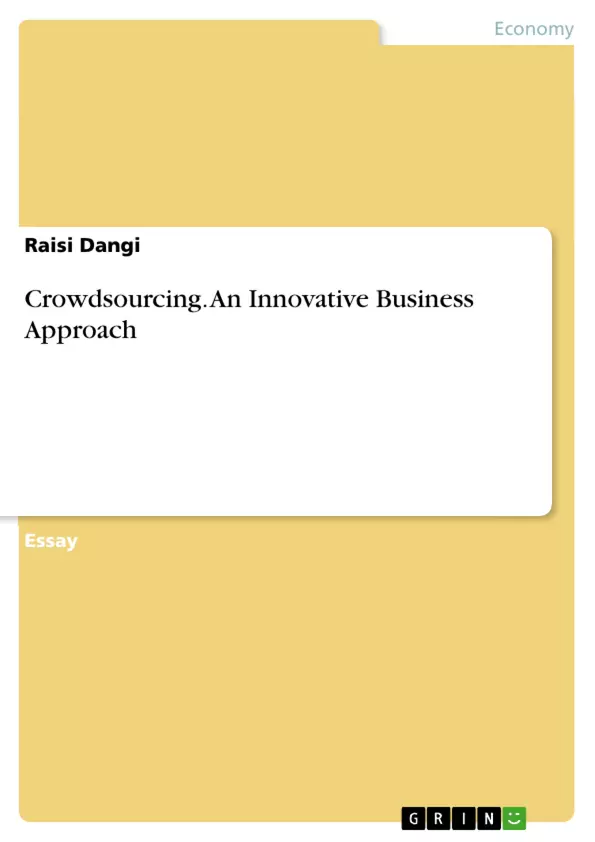Crowd sourcing is an evolving platform that is helping business problems solve faster, with best quality and at the least possible cost. It is emerging as a new on-line distributed network, where crowd of people join hands to complete a task. The scalable workforce is highly accessible; thereby enterprises are readily implicating the concept in their projects. No one knows everything, everyone knows something and all the knowledge resides in humanity. Crowd Wisdom reflects on the dramatic, economic, cultural and political implications of applying the open source idea to a variety of fields other than the IT sector and addresses the unique opportunities in building a new Business Model. This paper provides an insight to both theoretical and exemplar cases distinguishing it from open source production. The paper also set possibilities to explore the potential of setting a business model, as a new trend setter by canvassing a large crowd of people with ideas, skills and participation. It also exploits crowd of innovators and the potential of using it beyond profit sectors.
Inhaltsverzeichnis (Table of Contents)
- Introduction
- All Knowledge resides in Humanity
- Some Cases:
- InnoCentive
- Threadless
- iStockphoto
- Crowdsourcing, Open Innovation, User Innovation, Open Source
- Open Innovation
- User Innovation
- Open Source
- Crowdsourcing vs. Outsourcing
Zielsetzung und Themenschwerpunkte (Objectives and Key Themes)
This paper explores the concept of crowdsourcing as an innovative business approach. It aims to provide a comprehensive understanding of this evolving platform, highlighting its advantages, limitations, and potential for setting a new business model. The paper also analyzes the relationship between crowdsourcing and other related concepts, such as open innovation, user innovation, and open source.- Crowdsourcing as an Innovative Business Approach
- The Power of Crowds: Utilizing Collective Wisdom and Expertise
- Comparison with Related Concepts: Open Innovation, User Innovation, and Open Source
- Advantages and Limitations of Crowdsourcing
- Potential of Crowdsourcing beyond Profit Sectors
Zusammenfassung der Kapitel (Chapter Summaries)
- **Introduction**: This chapter defines crowdsourcing and provides a brief historical overview of its emergence, highlighting its origins and key proponents. It emphasizes the concept of collective wisdom and the potential for harnessing the knowledge of a large network of individuals.
- **Some Cases**: This chapter examines successful examples of crowdsourcing in various industries. It focuses on real-world applications and the impact of this approach on businesses such as InnoCentive, Threadless, and iStockphoto. Each case study illustrates how crowdsourcing can be effectively used to solve problems, generate ideas, and drive innovation.
- **Crowdsourcing, Open Innovation, User Innovation, Open Source**: This chapter delves into the relationship between crowdsourcing and other related concepts. It analyzes open innovation, user innovation, and open source, highlighting their similarities and differences. This section provides a deeper understanding of the broader context in which crowdsourcing operates and its potential applications.
- **Crowdsourcing vs. Outsourcing**: This chapter contrasts crowdsourcing with traditional outsourcing practices. It explores the key differences in terms of the selection process, expertise, and the structure of the work. This section sheds light on the unique aspects of crowdsourcing that distinguish it from more conventional outsourcing models.
Schlüsselwörter (Keywords)
This paper explores the burgeoning field of crowdsourcing, a collaborative business model leveraging the collective intelligence and efforts of a diverse group of individuals. It examines its unique characteristics, advantages, and challenges, placing it within the broader context of open innovation, user innovation, and open source. Key concepts discussed include crowdsourcing platforms, innovation, collaborative problem-solving, collective wisdom, and new business models.Frequently Asked Questions
What is the basic definition of crowdsourcing according to this paper?
Crowdsourcing is an online distributed network platform where a crowd of people collaborates to solve business problems faster, with higher quality, and at lower costs.
How does crowdsourcing differ from traditional outsourcing?
Unlike traditional outsourcing, which usually involves specific contracts with known providers, crowdsourcing leverages a large, often anonymous crowd with diverse skills and collective wisdom.
Which real-world examples of crowdsourcing are discussed?
The paper examines successful cases such as InnoCentive, Threadless, and iStockphoto to illustrate how the model works in different industries.
What is the relationship between crowdsourcing and open source?
While both rely on community participation, the paper distinguishes crowdsourcing as a business model that can be applied to fields far beyond the IT sector and software development.
Can crowdsourcing be used outside of the profit sector?
Yes, the text explores the potential of using crowds of innovators for non-profit sectors and social problem-solving.
- Arbeit zitieren
- Dr. Raisi Dangi (Autor:in), 2014, Crowdsourcing. An Innovative Business Approach, München, GRIN Verlag, https://www.grin.com/document/267272



